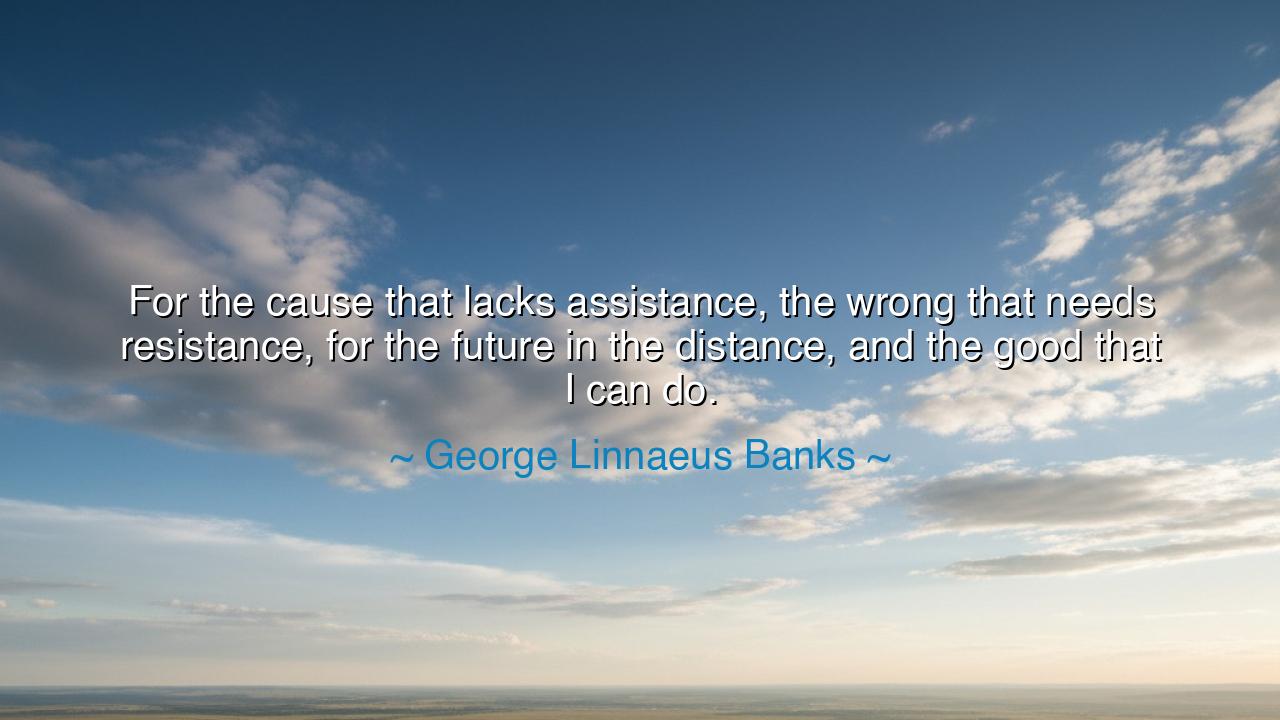
For the cause that lacks assistance, the wrong that needs
For the cause that lacks assistance, the wrong that needs resistance, for the future in the distance, and the good that I can do.






“For the cause that lacks assistance, the wrong that needs resistance, for the future in the distance, and the good that I can do.” Thus wrote George Linnaeus Banks, a poet of conscience, whose verse speaks not merely to the mind, but to the moral soul of humankind. His words, like a trumpet in the stillness, summon every heart to rise above comfort and indifference, to act not for fame or gain, but for justice, compassion, and duty. In this single sentence, Banks captures the eternal creed of those who choose to live not for themselves, but for the world—a creed that belongs to prophets and reformers, dreamers and doers, to all who believe that goodness must not remain silent in the face of wrong.
The origin of this quote lies in Banks’s 19th-century poem, What I Live For, a meditation on the purpose of life and the nobility of service. In an age shadowed by inequality and moral struggle, Banks’s words were both a reflection of his time and a prophecy for all time. He saw the world not as it was, but as it could be, and he urged every person to take up their part in its redemption. His message is timeless: that the worth of a life is not measured in wealth or comfort, but in the courage to stand for what is right, even when the world turns away.
The first phrase—“For the cause that lacks assistance”—calls us to look upon the neglected, the forgotten, the voiceless. There will always be causes that stand abandoned, not because they are unworthy, but because they are unpopular, difficult, or dangerous. It is easy to support the cause that triumphs; the true measure of virtue lies in defending the one that struggles. History remembers those who reached out when others withdrew—those who lit candles in the darkness rather than cursing the night. To act for a cause that “lacks assistance” is to act out of love, not ambition; faith, not convenience.
Then comes the second charge: “the wrong that needs resistance.” Here Banks strikes the heart of moral action. Evil often advances not by the strength of its own will, but by the silence of the good. To resist wrong is not to rage blindly against the world, but to stand firmly for what is just and humane. Think of Mahatma Gandhi, who resisted empire not with violence, but with the quiet power of truth. Think of Martin Luther King Jr., who faced hatred with steadfast love. These were men who understood that resistance is not destruction—it is redemption through courage. Banks’s words remind us that to live rightly is to resist the tide of indifference that sweeps through every age.
The poet then lifts his gaze to the horizon: “for the future in the distance.” It is not enough to live for the moment. The wise live for the generations yet unborn, planting trees whose shade they will never sit under. The builder of cathedrals knew this truth, as did every reformer and inventor who labored for a world they would never see completed. Banks calls us to be custodians of hope, to imagine a better world, and to work toward it even when the end is far beyond sight. The “future in the distance” belongs to those who act today with foresight and faith.
Finally, Banks speaks of “the good that I can do.” In these words, he returns from the vast and lofty to the humble and immediate. We cannot heal the world entire, but we can perform the small acts of goodness that form its foundation. To feed one hungry soul, to speak one word of kindness, to defend one life from cruelty—these are not small deeds, though they seem so. The greatest revolutions of spirit are born in gestures of compassion. Banks reminds us that the power of goodness does not lie in grand gestures, but in steady, daily acts of light.
In his words, we find a vision for how to live a life of purpose. Be the one who aids the forgotten cause. Be the voice that resists injustice. Be the dreamer who looks toward the far future with unbroken hope. And above all, be the soul that does good, even when no one is watching. The world changes not by the noise of the many, but by the quiet faithfulness of the few.
So, my listener, take this verse as a creed for living. When you rise each day, ask not what the world can give you, but what wrong you can resist, what good you can do, what hope you can nurture. For in the end, it is not power or fame that grants immortality—it is service. And when your life’s work is done, may others say of you that you lived, as George Linnaeus Banks once wrote, for the cause, the right, the future, and the good—and that in doing so, you helped light the way for all who follow.






AAdministratorAdministrator
Welcome, honored guests. Please leave a comment, we will respond soon